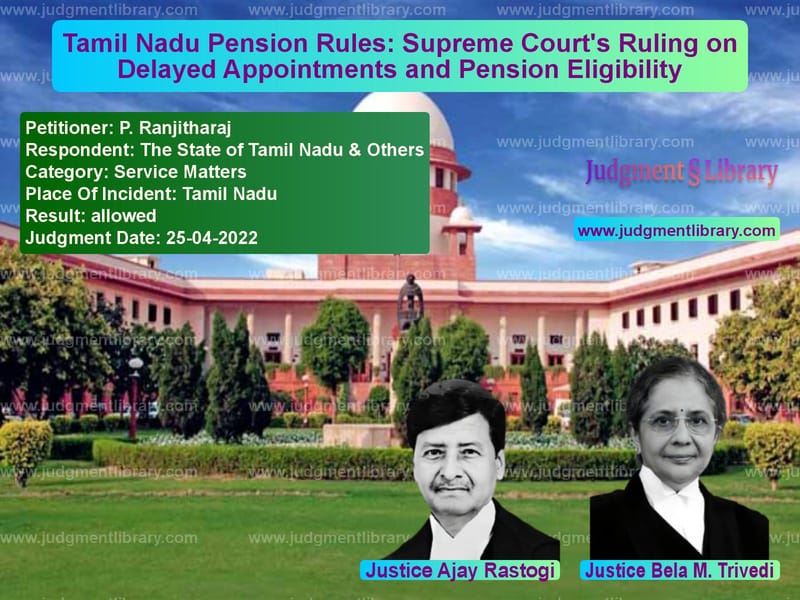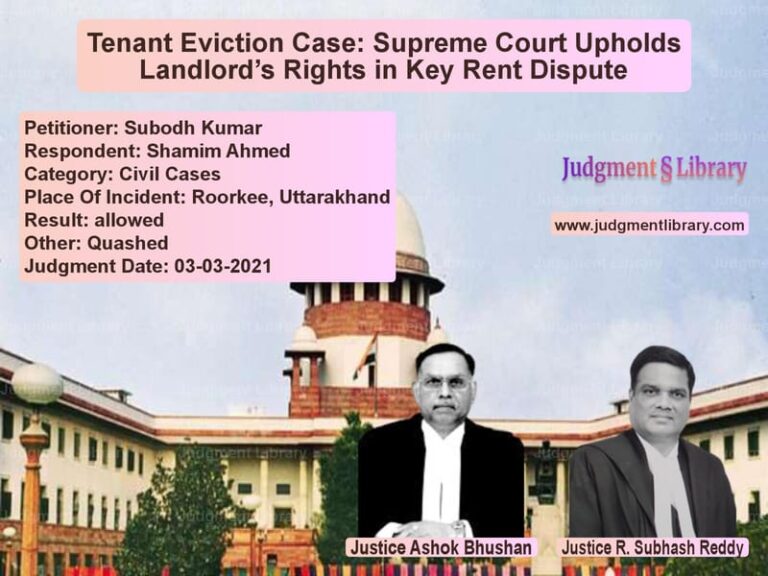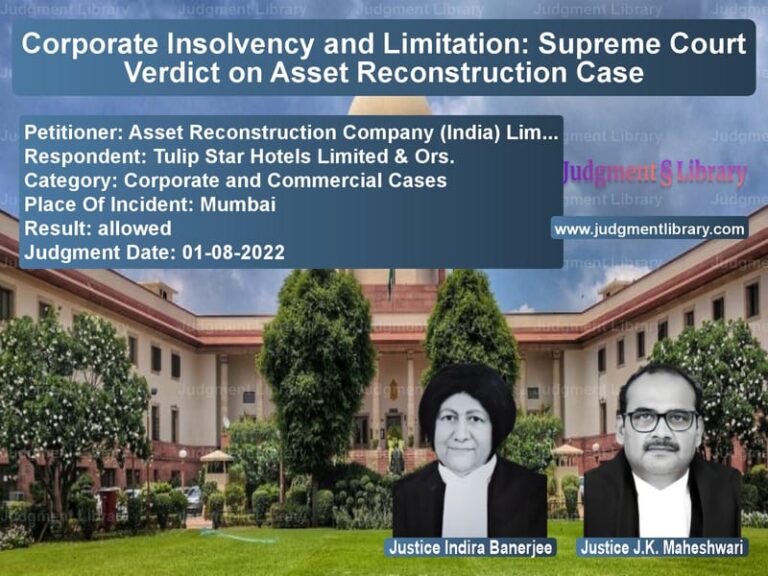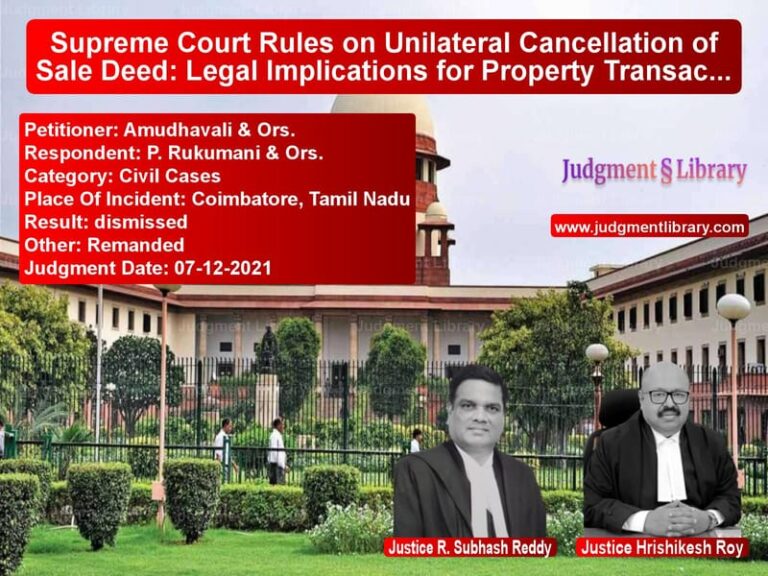Tamil Nadu Pension Rules: Supreme Court’s Ruling on Delayed Appointments and Pension Eligibility
The Supreme Court of India recently ruled in the case of P. Ranjitharaj vs. The State of Tamil Nadu & Others, which dealt with the denial of pension benefits under the Tamil Nadu Pension Rules, 1978, due to delayed appointments of selected candidates. The ruling has far-reaching implications for government employees who were denied pension benefits due to administrative delays in their appointment process.
The appellants, who were selected for the post of Assistant Public Prosecutor (APP) Grade II in Tamil Nadu, were denied inclusion under the Tamil Nadu Pension Rules, 1978, due to the delay in their appointments. The delay, which was not attributable to them, resulted in their appointments falling under the new Contributory Pension Scheme introduced after April 1, 2003. The Supreme Court, in its ruling, set aside the decision of the High Court and directed that the appellants be treated as members of the Tamil Nadu Pension Rules, 1978, for all benefits, including retiral benefits.
Background of the Case
The case stemmed from an advertisement issued by the Tamil Nadu Public Service Commission (TNPSC) on November 9, 2001, to fill 53 vacancies for Assistant Public Prosecutor (APP) Grade II posts. The selection process was conducted, and a final list of selected candidates was sent to the State Government.
On September 24, 2002, the Tamil Nadu Government appointed 51 selected candidates. However, the names of the appellants were withheld due to the need for further verification and clearance from the Commission. Despite receiving clearance from the Commission on September 3, 2002, much before the appointments were made, the State Government did not issue their appointment orders at the same time. As a result, the appellants were appointed much later, on April 23, 2004, and August 23, 2005, respectively.
In the meantime, on August 6, 2003, the Tamil Nadu Government amended the Tamil Nadu Pension Rules, 1978, introducing a new Contributory Pension Scheme that applied to employees appointed on or after April 1, 2003. Since the appellants were appointed after this cut-off date, they were placed under the Contributory Pension Scheme rather than the Tamil Nadu Pension Rules, 1978, even though their names were initially cleared for appointment before April 1, 2003.
Petitioners’ Arguments
The petitioners, represented by their counsel, argued that:
- They were selected through the same recruitment process as other candidates who were appointed before April 1, 2003.
- The delay in their appointments was due to administrative lapses of the State Government and not due to any fault of their own.
- Despite the delayed appointments, they were granted all other benefits, including seniority and promotions, in line with candidates who were appointed earlier.
- The High Court erred in holding that their appointment dates determined their pension scheme eligibility, despite their selection being part of the same recruitment cycle.
Respondents’ Arguments
The State of Tamil Nadu, defending the High Court’s ruling, contended that:
- The Tamil Nadu Pension Rules, 1978, as amended in 2003, clearly stipulated that only employees appointed before April 1, 2003, were eligible for the old pension scheme.
- Since the appellants were appointed after this date, they were automatically covered under the new Contributory Pension Scheme.
- The amendments to the pension rules were not challenged by the appellants, and as such, the High Court’s ruling was valid and did not require interference.
Supreme Court’s Judgment
The Supreme Court bench, comprising Justices Ajay Rastogi and Bela M. Trivedi, ruled in favor of the appellants and overturned the High Court’s decision. The key observations made by the Court were:
- Selection and Appointment Delays: The Court noted that the appellants were part of the same selection process as other candidates who were appointed before April 1, 2003. Their exclusion from the Tamil Nadu Pension Rules, 1978, was due to delays that were not attributable to them.
- State’s Responsibility: The Court emphasized that the State Government had no justification for withholding the appellants’ appointments for two to three years after their names had been cleared by the Commission.
- Equal Treatment: The Court observed that since the appellants had been granted other service benefits, such as seniority and promotions, they should not be discriminated against for pension benefits.
- Reinstatement under the Tamil Nadu Pension Rules, 1978: The Court ruled that the appellants should be treated as members of the Tamil Nadu Pension Rules, 1978, and directed the State to extend all benefits under the scheme, including retiral benefits.
Implications of the Judgment
The Supreme Court’s ruling has significant implications for government employees facing similar issues of delayed appointments:
- Protection of Employee Rights: The judgment sets a precedent that government employees cannot be penalized for administrative delays in their appointments.
- Uniformity in Benefits: The ruling ensures that all candidates selected in the same recruitment cycle receive equal treatment in terms of pension benefits.
- State Accountability: The ruling highlights the State’s responsibility in ensuring timely appointments and preventing undue hardships to selected candidates.
- Reassessment of Pension Eligibility: The case may prompt reconsideration of pension eligibility rules for employees who were appointed late due to no fault of their own.
Conclusion
The Supreme Court’s decision in P. Ranjitharaj vs. The State of Tamil Nadu & Others is a landmark ruling that reinforces the principle of fairness in public employment. The judgment underscores that administrative delays should not deprive selected candidates of their rightful benefits, particularly when they have been granted other service advantages such as seniority and promotions. This ruling will likely serve as a guiding principle for similar cases in the future, ensuring that government employees are not unfairly deprived of pension benefits due to bureaucratic delays.
Read also: https://judgmentlibrary.com/supreme-court-rules-on-guest-faculty-employment-rights-and-limitations/
Petitioner Name: P. Ranjitharaj.Respondent Name: The State of Tamil Nadu & Others.Judgment By: Justice Ajay Rastogi, Justice Bela M. Trivedi.Place Of Incident: Tamil Nadu.Judgment Date: 25-04-2022.
Don’t miss out on the full details! Download the complete judgment in PDF format below and gain valuable insights instantly!
Download Judgment: p.-ranjitharaj-vs-the-state-of-tamil-n-supreme-court-of-india-judgment-dated-25-04-2022.pdf
Directly Download Judgment: Directly download this Judgment
See all petitions in Pension and Gratuity
See all petitions in Recruitment Policies
See all petitions in Employment Disputes
See all petitions in Judgment by Ajay Rastogi
See all petitions in Judgment by Bela M. Trivedi
See all petitions in allowed
See all petitions in supreme court of India judgments April 2022
See all petitions in 2022 judgments
See all posts in Service Matters Category
See all allowed petitions in Service Matters Category
See all Dismissed petitions in Service Matters Category
See all partially allowed petitions in Service Matters Category







